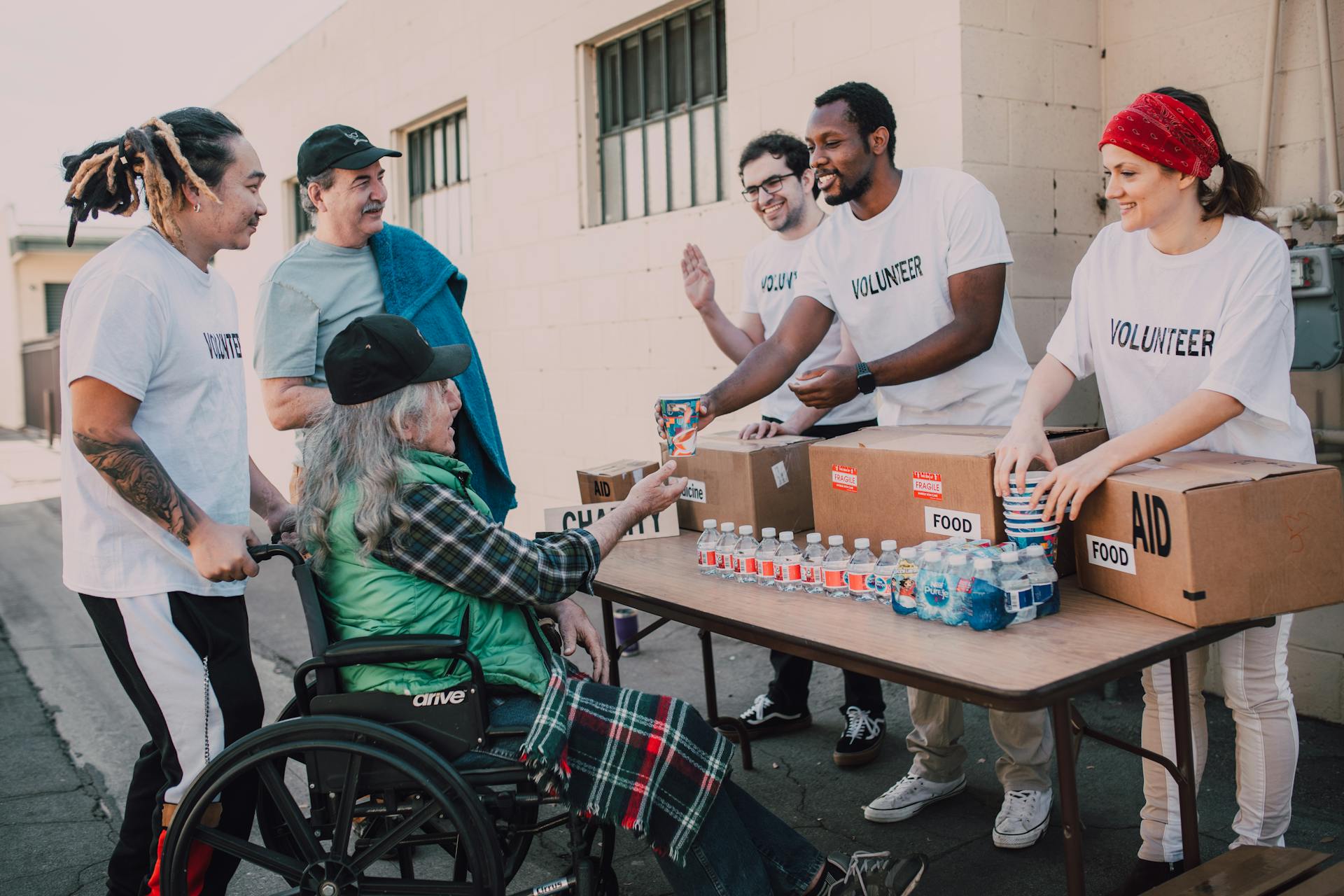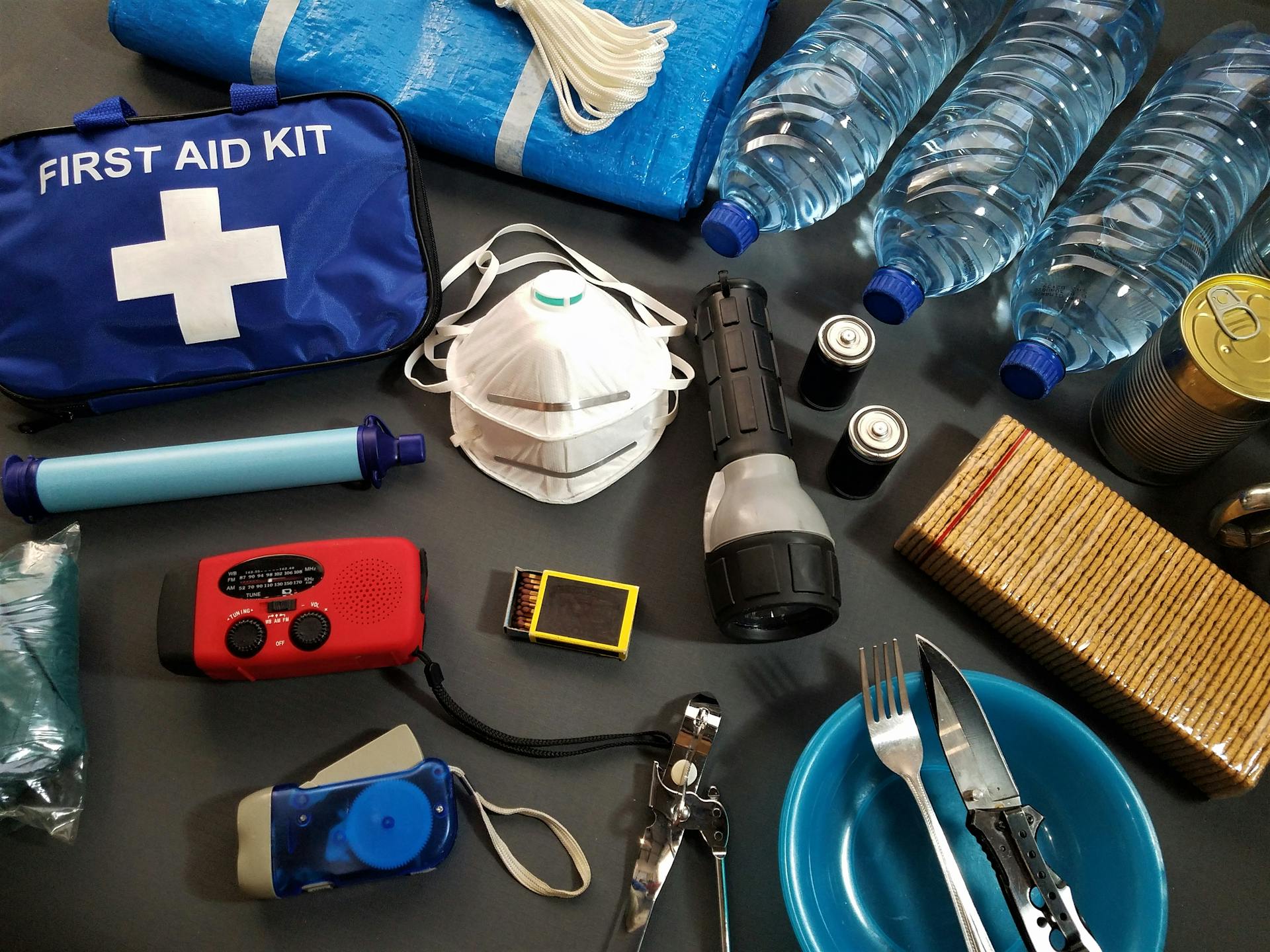
Fundraising events can be a great way for nonprofits to raise money, but they also come with risks. A cancelled event due to unforeseen circumstances can lead to significant financial losses.
Nonprofits can protect themselves against these risks by purchasing fundraising event insurance. This type of insurance can provide financial protection in case an event is cancelled or postponed due to unforeseen circumstances.
The cost of fundraising event insurance can vary depending on the type and size of the event. A small charity event may cost around $200 to $500 to insure, while a larger event can cost upwards of $2,000.
Having insurance in place can give nonprofits the peace of mind to plan and execute their events without worrying about the financial consequences of a cancellation.
Broaden your view: Using Venmo for Fundraising
Why You Need Fundraising Event Insurance
Having fundraising event insurance is a must for parent-teacher groups and nonprofits alike. You never know when something unexpected might happen, and having insurance can provide financial security.

Liability protection is a key reason to get insurance. It helps minimize the negative impact of unforeseen events, protects assets and reputation, and promotes safety and responsible decision-making.
Most venues require insurance when hosting an event at their location. So, it's essential to have insurance to avoid being turned down or having to pay out of pocket for any damages.
Special event insurance can offer valuable protection against a wide variety of unexpected risks, including injuries to participants and damages to the event space.
Here are some reasons why you need fundraising event insurance:
- Minimizing the negative impact of unforeseen events
- Protecting assets and reputation
- Promoting safety and responsible decision-making
Having insurance can also enhance credibility and professionalism, making your parent-teacher group or nonprofit more attractive to potential sponsors and donors.
Types of Insurance Coverage
When assessing the size and scope of your fundraising event, it's essential to consider the number of attendees and the type of activities planned. Larger events or those with higher-risk activities will generally require more comprehensive coverage.

Event insurance for nonprofits includes two main forms of liability coverage: property damage and bodily injury. This means your insurance will cover your legal fees and a settlement with the third party if your business is accused of a bodily injury or property damage liability claim.
Understanding the exclusions and limitations of your policy is crucial to avoid surprises when filing a claim. Make sure you're aware of what is and isn't covered to ensure you're adequately protected.
A different take: How to File Insurance Claim against Other Driver without Insurance
General Liability
General Liability is a crucial type of insurance coverage that every event organizer should consider. It protects you and your organization from financial losses due to third-party claims of bodily injury or property damage.
To understand the importance of General Liability, let's look at the requirements for events in the City of Seattle. According to Example 3, all events must show proof of General Liability insurance coverage with a minimum of $1,000,000 limit per occurrence.
If this caught your attention, see: Cryptocurrencies Events
This type of insurance is not just a requirement, but it also provides peace of mind for event organizers. With General Liability insurance, you can rest assured that you're protected in case something goes wrong.
The coverage includes third-party bodily injury liability, which is especially important for events that involve physical activities or high-risk activities. For example, if someone gets hurt at your charity event, your General Liability insurance will pay for their medical bills and lost wages, up to the policy's limit.
Here's a list of events that are typically covered under General Liability insurance:
Remember, General Liability insurance is not a one-size-fits-all solution. It's essential to work with an insurance expert to determine the right coverage for your specific event needs.
Third-Party Property Damage
Third-Party Property Damage is a crucial aspect of special event insurance coverage for nonprofits. This type of insurance pays for any property damages your nonprofit could be ordered to pay in court.
Accidents can happen at any event, and it's often the nonprofit that's held responsible, even if a guest is at fault. Your nonprofit's funds shouldn't be used to cover damages, which is why special event insurance coverage exists.
Special event insurance coverage pays for any property damages your nonprofit could be ordered to pay in court so that your organization doesn’t have to use its own funds. That way, you can use the money to further help your organization’s cause.
For example, let's say your nonprofit hosts a community football tournament and one of the players decides to celebrate after a touchdown. They spike the ball, and it bounces so hard that it hits the electronic scoreboard. The field owner is pretty upset and decides to sue your NPO for the damages. In this case, your nonprofit event insurance policy would pay to replace or repair the scoreboard.
Here are some key facts to keep in mind:
- Special event insurance coverage pays for property damages your nonprofit could be ordered to pay in court.
- Even if a guest is responsible for the incident, your nonprofit is typically the one responsible for making things right.
Special Considerations
Having the right insurance coverage for your fundraising event is crucial, but there are some special considerations to keep in mind. Most venues will require insurance when you host an event at their location, so it's essential to have a policy in place.
To ensure you're adequately covered, assess the size and scope of your event, considering the number of attendees, type of activities planned, and venue's location. Larger events or those with higher-risk activities will generally require more comprehensive coverage.
Some long-term business insurance policies can be beneficial for nonprofit organizations, providing more protection and potentially being more cost-effective if you're hosting multiple events during the year. Long-term policies include types of insurance that can provide additional coverage beyond a standard special event insurance policy.
Here are some potential risks to consider: Weather-related risks for outdoor eventsLiability concerns for events serving alcoholPotential property damage for events held in rented venues
Understanding the exclusions and limitations of your policy is crucial to avoid surprises when you need to file a claim. Make sure you're aware of what is and isn't covered to ensure you have a comprehensive understanding of your insurance requirements.
For another approach, see: In Insurance Policies the Insured Is Not Legally
Why Is Special Protection Crucial?

Having special protection, such as special event insurance, is crucial for nonprofit organizations that host events regularly. This type of insurance offers valuable protection against a wide variety of unexpected risks.
Your nonprofit organization can face a wide range of unexpected risks when hosting events, including injuries to participants, damage to the event space, and lawsuits for financial losses. These risks can be devastating to a small nonprofit, which is why having special event insurance is so important.
Special event insurance is also important if you want to protect your volunteers. Without this type of insurance, your nonprofit could be held liable for any injuries or damages that occur during an event.
Some venues even require nonprofits to show proof of insurance in order to get an event permit. This ensures that the venue knows that if anything were to happen, your insurance would cover the claim.
Here are some key reasons why special protection is crucial for nonprofits:
- Minimizing the negative impact of unforeseen events
- Protecting assets and reputation
- Promoting safety and responsible decision-making
Having special protection, such as special event insurance, can also enhance credibility and professionalism. This makes your nonprofit more attractive to potential sponsors and donors, who want assurance that their contributions are used responsibly and that the club has safeguards in place.
For another approach, see: K&k Special Event Insurance
Liquor Liability for Nonprofits
If you're planning to serve alcohol at a nonprofit event, you need to add a rider to your special event insurance policy to cover liquor liability claims. This is because a basic fundraising insurance policy usually excludes coverage for events where alcohol is sold or served.
A standard special event insurance policy protects your organization from many of the risks you face, but it doesn't cover alcohol-related accidents and liabilities.
You can reduce the Liquor Liability coverage amount to $1,000,000 if the event is organized by a non-profit organization. This is a significant reduction from the standard $2,000,000 limit per occurrence.
However, if you're hosting a beer garden or selling alcohol, you'll need to ensure that your insurance policy includes Host Liquor Liability coverage. This type of coverage is acceptable only when alcohol is being served to guests at the event free of charge.
Here's a breakdown of the Liquor Liability requirements for nonprofits:
Keep in mind that Liquor Liability insurance is essential to protect your nonprofit organization from the increased level of risk associated with serving alcohol at events.
Nonprofit Cost
The cost of special event insurance for nonprofits varies greatly depending on several factors.
The median premium for one-day special event insurance is $182.
For events lasting two to 10 days, the median premium is $250.
Events longer than 10 days see a slight increase in median premium to $257.
Most insurance companies include coverage for multiple events in your policy, often specifying the maximum number of participants your event can accommodate, along with other limitations.
Coronavirus Special Cover Cancellations
If you're planning an event and are worried about cancellations due to the coronavirus, it's essential to understand what your insurance covers.
Most nonprofit event insurance policies don't include cancellation coverage for communicable diseases, including COVID-19.
Some special event insurance policies do come with loss of deposit and event postponement coverage, which can help cover the cost of event deposits, regardless of the reason for cancellation.
You can purchase an event cancellation insurance rider from many insurance companies to include protection against COVID-19-related cancellations.
You should always check with your insurance company to see if you're eligible for a claim if your event gets canceled due to the coronavirus.
Curious to learn more? Check out: Travel Insurance Trip Cancellation Coverage
Third-Party Bodily Injury Liability
If someone gets hurt at your nonprofit's event, special event insurance pays for the person's medical bills and lost wages, up to the policy's limit. This is crucial for any charity event that involves physical activities, like a 5K run.
As mentioned in Example 4, if a runner trips over an unmarked curb on the course and sprains their ankle, your charity event insurance would pay for their hospital visit and X-ray, plus any rehabilitation expenses, like physical therapy. This coverage is vital to ensure that your organization can provide proper care for the injured person without breaking the bank.
In extreme cases, bodily injury claims can lead to costly lawsuits. Special event insurance covers your legal defense in such situations, so you don't have to worry about depleting your organization's resources to fight a lawsuit.
It's essential to have enough coverage based on the types of events you host. For instance, if your nonprofit organization decides to host a charity 5K, you'll want to ensure that your special event insurance policy has sufficient coverage for bodily injury claims.
Here are some examples of bodily injury claims that special event insurance might cover:
- Medical bills for injuries sustained during the event
- Lost wages for people who are unable to work due to their injuries
- Rehabilitation expenses, such as physical therapy
- Legal defense costs in case of a lawsuit
Insurance for Specific Risks
If your nonprofit organization hosts events with a high risk of bodily injury, such as a charity 5K, you'll want to make sure your special event insurance covers third-party claims. This type of insurance pays for medical bills and lost wages, up to the policy's limit.
Injuries can happen unexpectedly, like when a runner trips over an unmarked curb on the course. Your charity event insurance would cover the hospital visit and rehabilitation expenses.
Special event insurance also covers property damage liability, which can be a significant risk if you're hosting an event at a venue that requires a deposit. If your event space gets damaged accidentally, your insurance will cover the costs of repairs or replacement.
Check this out: Life Insurance That Covers an Insured's Whole Life
Liquor Liability
Serving alcohol at events can be a recipe for disaster, literally. Liquor liability insurance coverage is a must-have to protect your organization from the risks associated with serving booze.
If you're planning to serve alcohol at your event, you'll need to show proof of Liquor Liability insurance coverage with a minimum of $2,000,000 limit per occurrence. This is non-negotiable.
Consider reading: Alcohol Event Insurance

But, if the event is organized by a non-profit organization, the Liquor Liability coverage amount can be reduced to $1,000,000. Just keep in mind that Host Liquor Liability coverage is only acceptable when alcohol is being served to guests at the event free of charge, not for beer gardens or other alcohol sales.
Some events, like those with motorized individual participant activities, require a higher level of coverage. For these activities, you'll need a minimum of $2,000,000 CSL per occurrence.
Here's a quick rundown of the liquor liability insurance requirements:
Don't skimp on liquor liability insurance – it's better to be safe than sorry.
Nonprofit Long-Term Coverages
Nonprofit organizations that hold events on a regular basis should consider purchasing long-term insurance policies. These policies provide more protection than standard special event insurance.
Long-term insurance policies can be more cost-effective if you're hosting multiple events during the year. This is especially true for nonprofits that host more than one or two events annually.
Long-term business insurance policies can be beneficial for nonprofit organizations. Some of these policies include long-term insurance coverages specifically designed for nonprofits.
A unique perspective: A Life Insurance Company Sells a Term Insurance Policy
Common Risks
Accidents and injuries can happen at any moment, which is why it's essential to be prepared with insurance to avoid costly medical bills and legal fees.
Slips, trips, and falls are common at fundraising events, making it crucial to have coverage in place.
Damage to the venue or rented equipment is another significant risk, whether it's a broken window or damaged audio-visual equipment.
Having the right coverage helps manage these unexpected costs, so it's essential to consider this when planning events.
Cancellation risks are a reality, and events might need to be canceled due to extreme weather, natural disasters, or other emergencies.
Without cancellation coverage, the financial impact of such disruptions can be devastating.
Liquor liability insurance is a must-have for events involving alcohol, as it covers claims related to alcohol consumption and protects your nonprofit from potential lawsuits.
A unique perspective: Event Cancellation Insurance Limitations
Choosing the Right Coverage
Start by evaluating the size and scope of your event, considering the number of attendees, type of activities planned, and venue's location. Larger events or those with higher-risk activities will generally require more comprehensive coverage.
Larger events or those with higher-risk activities will generally require more comprehensive coverage. Identify specific risks associated with your event, such as weather-related risks for outdoor events or liability concerns for events serving alcohol.
Weather-related risks for outdoor events or liability concerns for events serving alcohol are just a few examples of potential risks. Understanding the exclusions and limitations of your policy is crucial, so make sure you're aware of what is and isn't covered.
Reading the fine print is essential to avoid surprises when filing a claim. Consulting with an insurance expert can provide tailored advice based on your organization's unique needs and help you navigate different coverage options.
ALKEME insurance experts can help you select a policy that offers the best protection. This ensures you have a comprehensive understanding of your insurance requirements and confidence that you are adequately covered.
A different take: Who Is the Insured on a Life Insurance Policy
Understanding Insurance Requirements
To ensure your fundraising event is properly insured, you'll need to meet certain requirements. General Liability insurance is a must-have, with a minimum coverage limit of $1,000,000 per occurrence.

When it comes to proof of insurance, you'll need to provide two specific documents: the Certificate of Insurance and the "Additional Insured" policy endorsement on form CG 20 12 or CG 2026. Both of these must name the City of Seattle as an Additional Insured.
Here are the key details to keep in mind:
Detailed Requirements
To provide adequate insurance coverage, you'll need to understand the detailed requirements.
Liability insurance is often a mandatory requirement for businesses, with the minimum coverage amount varying by state.
Businesses with employees must also carry workers' compensation insurance, which typically requires a specific minimum coverage amount per employee.
Health insurance is a common requirement for individuals, with the Affordable Care Act mandating coverage for certain essential health benefits.
Auto insurance requirements vary by state, with some states mandating liability coverage and others requiring additional coverage types.
Homeowners insurance is often required by lenders when purchasing a home, with the minimum coverage amount typically ranging from $50,000 to $200,000.
Consider reading: Is Dental Insurance Considered Health Insurance
One-Day vs. Year-Round Liability
Single event insurance is a short-term coverage that protects events from one to four consecutive days, making it a cost-effective option for groups that only hold a single event yearly.
This type of insurance is usually less expensive than annual plans, which can be a significant advantage for small organizations.
AIM's single event insurance offers flexibility to plan, which is useful if you're unsure of the type or number of events you hope to hold in the forthcoming year.
On the other hand, year-round general liability insurance provides more comprehensive coverage for a broader range of situations.
The key difference between short-term and general liability is the scope and duration of coverage.
Here's a comparison of the two options:
Keep in mind that year-round general liability insurance costs more than short-term coverage, but it's still a budget-friendly option for PTAs, PTOs, and booster clubs.
AIM's tailored General Liability insurance offers customization options for embezzlement insurance, property insurance, and directors and officers (D&O) insurance, providing peace of mind for your organization.
Examples and Scenarios

A hurricane forced a nonprofit to cancel their outdoor fundraising concert, but they were able to recover their expenses thanks to event cancellation coverage.
This coverage is a lifesaver for nonprofits who have invested time and resources into planning an event. It's a necessary investment to protect against financial losses.
A gala attendee tripped on a loose carpet and sustained injuries, but general liability coverage paid for the medical costs and legal fees, allowing the event to proceed smoothly.
This type of coverage is essential for protecting nonprofits from unexpected medical or legal expenses.
Some guests accidentally damaged a rented venue during a charity auction, but property damage coverage compensated for the repairs, maintaining the nonprofit’s good relationship with the venue provider.
This coverage is a must-have for nonprofits who rent venues for their events.
Curious to learn more? Check out: Not for Profit Event Insurance
Frequently Asked Questions
How much does a $1,000,000 liability insurance policy cost?
On average, a $1 million liability insurance policy costs around $500 per year, or $42 per month. However, costs can vary, with some paying as little as $30 per month.
Do small nonprofits need insurance?
Yes, small nonprofits need insurance to protect against claims for bodily injury and property damage. General liability insurance is a must-have to safeguard your organization's assets and reputation.
Sources
- https://alkemeins.com/understanding-event-insurance-for-nonprofit-fundraisers/
- https://aim-companies.com/dont-limit-your-fundraising-event-fun-use-one-day-event-insurance/
- https://www.seattle.gov/special-events/policies-and-compliance/insurance
- https://www.insureon.com/blog/special-event-insurance-for-nonprofit-organizations
- https://www.kandkinsurance.com/programs/event-insurance/short-term-event-insurance
Featured Images: pexels.com


